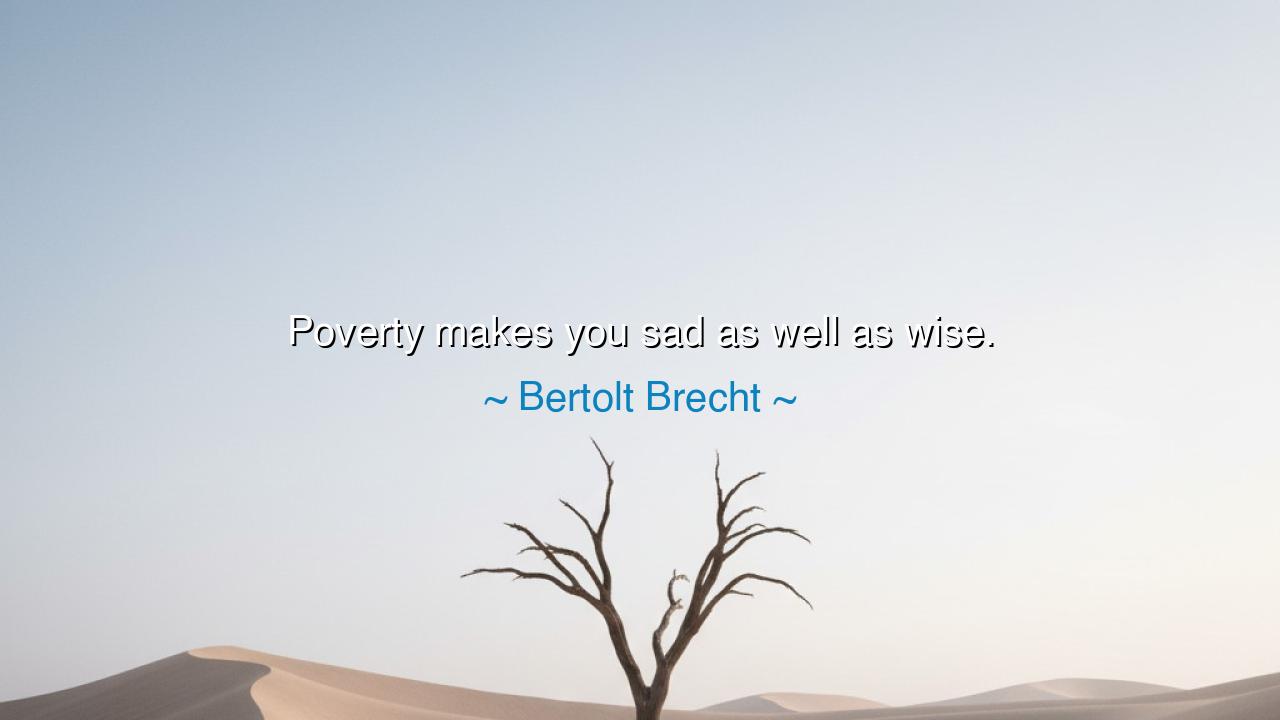
Poverty makes you sad as well as wise.






In the somber and illuminating words of Bertolt Brecht, the German playwright and poet, we encounter a truth carved from the raw stone of human experience: “Poverty makes you sad as well as wise.” It is a brief sentence, yet within it lives an entire philosophy — a reflection on suffering, on insight, and on the strange alchemy by which hardship transforms the soul. For Brecht, who lived through war, exile, and political oppression, these words were not abstract. They were born of the streets, of hunger, of the ache of seeing a world that demands endurance yet withholds justice.
The origin of this quote lies in Brecht’s lifelong engagement with the human condition — particularly the lives of the poor and the forgotten. He saw poverty not merely as material deprivation, but as a crucible that reveals the essence of life itself. Poverty strips away illusion. It teaches — brutally, honestly — what comfort and privilege often conceal. In it, one learns the worth of bread, the value of kindness, the power of perseverance. Yet it also brings sadness, for that same clarity exposes the cruelty of systems that perpetuate suffering, the frailty of human mercy, and the indifference of fate. Thus Brecht’s words are not complaint but revelation: wisdom and sorrow walk hand in hand.
To the ancients, such an idea would not have been foreign. The Stoics — Epictetus, himself born a slave — taught that adversity is the school of the spirit. “Difficulties,” he said, “show what men are.” Poverty, in this view, is not merely misfortune but initiation. It breaks the false self and summons the true one. Yet even the ancients knew that enlightenment born from pain comes at a price. The same fire that tempers steel can also burn the flesh. Thus Brecht, like Epictetus before him, speaks to the paradox of suffering — that it refines the mind but scars the heart. The poor see more clearly, but they also feel more deeply.
History, too, offers countless witnesses to this truth. Consider Charles Dickens, who as a child was forced to work in a blacking factory while his father languished in debtors’ prison. Those years of poverty carved into him both sorrow and insight. He would later write Oliver Twist and David Copperfield, stories that exposed the cruelty of industrial society and championed the dignity of the poor. The sadness of his youth never left him, but neither did its wisdom. His suffering became vision; his loss became compassion. In this, he lived the very essence of Brecht’s observation — that the heart broken by want becomes the eye that sees truth.
Yet Brecht’s words carry not only observation, but warning. For while poverty may awaken wisdom in those who endure it, it also indicts those who allow it to persist. The sadness it brings is not only personal but collective — the sadness of a society that values wealth above empathy, convenience above justice. To ignore the suffering of others is to dull the moral senses, to live unwise and unfeeling. The truly enlightened, Brecht reminds us, are not those who rise above suffering alone, but those who seek to end it for others. Wisdom born of sorrow must lead to compassion, or it curdles into cynicism.
In this, Brecht’s words echo the timeless moral rhythm of life itself: the descent before understanding, the darkness before vision. The poor man, stripped of illusion, sees the truth of existence — that happiness is fleeting, that human connection is sacred, that meaning is not found in abundance but in resilience. Yet his sadness, too, is sacred. It is the grief of one who knows what the world could be, and what it too often is not. To dismiss that sadness is to turn away from wisdom; to honor it is to awaken to humanity’s shared fragility.
And so the lesson of this quote is both solemn and empowering: let the wisdom of suffering awaken empathy, not despair. You need not live in poverty to understand its truth. Look upon the struggles of others with open eyes and open heart. Learn from those who endure, for their strength and insight are teachers greater than comfort could ever provide. Do not fear sadness — it is the shadow of wisdom, the sign that the heart still feels and still cares.
Thus, in the spirit of Bertolt Brecht, remember this: when life humbles you, when loss strips away your ease, do not curse the lesson. Let the sadness teach you tenderness. Let the hardship shape your soul into something vast, patient, and kind. For in the end, it is not wealth or pleasure that deepens the human spirit — it is the quiet wisdom born from sorrow, and the enduring compassion it leaves behind.






AAdministratorAdministrator
Welcome, honored guests. Please leave a comment, we will respond soon